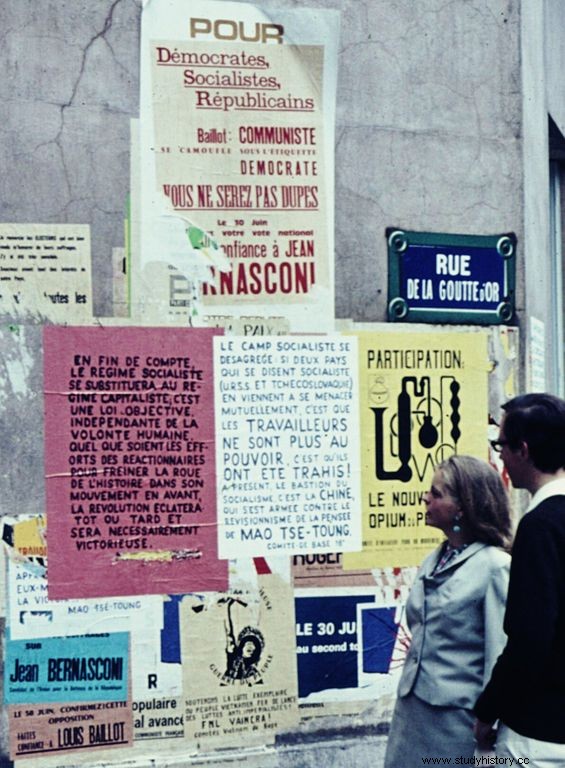- General de Gaulle was put on the ballot in the 1965 elections:he had to face the candidate François Mitterrand in the second round of the presidential election. Its prestige is affected, while the opposition regains some credibility.
- The Gaullist party, renamed "Union of Democrats for the V th République” lost many seats in the legislative elections of 1967. This double electoral disappointment testifies to the fragility of the regime of the Fifth Republic and to the tensions.
- The personalization of the regime is denounced by the opposition, so that tensions are felt even within the majority:
- General de Gaulle's personal position in favor of the separatists created a diplomatic crisis with the Canadian state. In his public speech, he wrote "long live free Quebec" without the problem having been addressed in parliament;
- Valéry Giscard d'Estaing denounces "the solitary exercise of power".
- It was in this general malaise that the deleterious climate reached its peak in May 1968.
- The socio-cultural context plays a significant role:urbanization is accelerating, school and university education is increasing, the culture of leisure is developing, youth is asserting itself as a socio-cultural category in its own right, mores evolve.
- On March 22, leftist students at the faculty of Nanterre attempt to denounce the contrast between the wealth of privileged society and the poorest, under the influence of sociology student Daniel Cohn-Bendit.
May 1968

Characters
Charles de Gaulle
George Pompidou
Daniel Cohn-Bendit
Francois Mitterrand
Procedure
The crisis of May 1968 was above all a student crisis:it originated in the universities, where intellectual youth contested the consumer society which weakened the personality of man. The movement is the bearer of an anti-consumer, anti-authoritarian and very libertarian political ideal, focusing in particular on fundamental freedoms. The themes covered are those of social justice, the struggle against capitalist society, but also against the Soviet communist bureaucracy. The "March 22 movement", bringing together various leftist student movements, led to the closure of the Nanterre faculty on May 2, 1968. Fights between students and the police ensued, clashes degenerated into riots and the May 10, barricades are erected in the capital.
A demonstration is organized on May 13 by the unions to fight against police repression, accompanied by a general strike. The crisis becomes a social crisis:strikes multiply (Renault on May 16) as well as occupations of premises. The confused, even contradictory demands of the demonstrators (workers, students, unions) complicate the task for the government, which is struggling to find interlocutors. General de Gaulle, discouraged, tries to open discussions with the unions and employers. Prime Minister George Pompidou gives satisfaction to the CGT:on May 27, the Grenelle agreements concede salary increases, the reduction of working hours and the right to organize. But this success does not prevent the continuation of the strikes.
The crisis becomes a political crisis. The inability to act on events and the silence of General de Gaulle give the feeling that the regime is dying. Mitterrand calls for the constitution of a provisional government, the Communist Party calls for a "popular government". But this crisis reached its climax with the "disappearance of General de Gaulle" on May 29 and 30, 1968:he went to Baden-Baden to seek advice from General Massu. Convinced of taking matters into his own hands, he announced the dissolution of the National Assembly and called for civic action by the French. The strikes gradually cease, and the movement fades.
Consequences
- The 1968 crisis was a social crisis that affected all industrial societies and which, in France, went beyond the political framework:it took root in the collective psychology of society. The May 1968 movement was not uniform, the demands were sometimes confused, but it marked a political break in France:it constituted one of the greatest challenges to the existing order.
- The government must respond to new socio-cultural aspirations:
- youth is asserting itself as a social and political reality;
- the transformation of mentalities, with in particular "sexual liberation", is a component of May 1968 (debates on feminism, contraception, mixed education);
- traditional institutions are called into question (the family, the Church, the army):anti-authoritarian demands are illustrated in the form of the slogan "it is forbidden to prohibit";
- the consumer society and the capitalist system are strongly criticized.
- Politically, the authority of General de Gaulle was undermined, while Pompidou seemed better able to manage the crisis. The appointment of Couve de Murville in place of Pompidou can be analyzed as General de Gaulle's desire to turn the page. After the announcement of Pompidou's candidacy, de Gaulle seeks to restore his authority through a reforming attitude:his referendum on regionalization is rejected and he draws the conclusion of the mistrust of the French towards him. He resigned on April 28, 1969.
